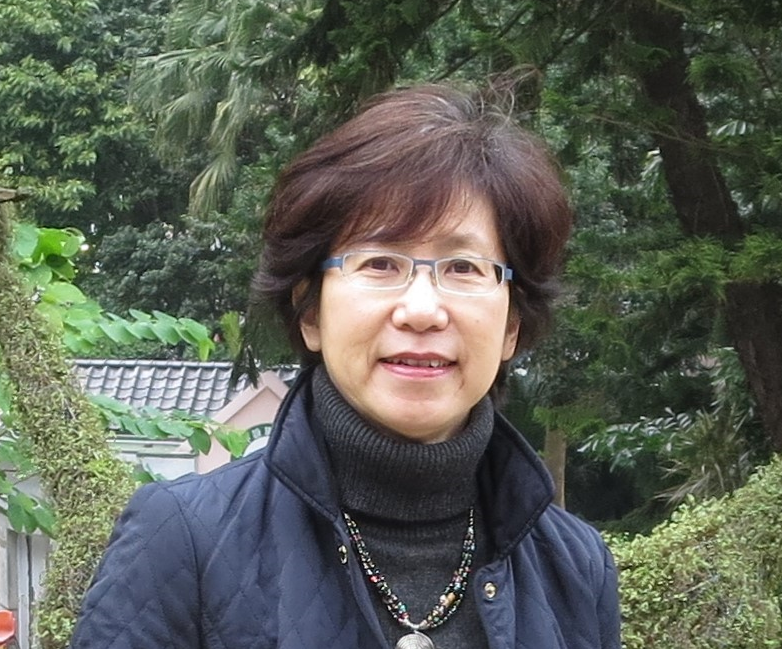HETL Note: We are proud to present this academic article on enhancing English competence by Dr Paula Hodgson and Dr Juliana Chau. This article examines how students responded to English-mediated activities at two Hong Kong universities. This case study explored the types of language-building factors that influence students’ choice in English-mediated authentic learning environments. Finding new ways to enhance English language competence is important in preparing students to function in a global employment market where English has become the de facto international language of business.
Authors’ bios:
 Dr Paula Hodgson is a doctoral graduate of the University of South Australia investigating organizational change for technology integration in universities in Hong Kong. She has been working in higher education since 1997, and is enthusiastic about innovative practices in university teaching, learning and assessment. Her recent research is on flipped classroom and mass open online courses (MOOCs) after her successive completion with distinction in three MOOCs. As an active practitioner and putting research in practice, she placed high value on a learning-centred approach to teaching and on engaging learners in a way that challenges their preconceived ideas in achieving both intended and unintended learning outcomes in outcome-based education. In the past two years, she has been focusing on programme evaluation of General Education in Hong Kong Baptist University. Dr Hodgson may be contacted at [email protected].
Dr Paula Hodgson is a doctoral graduate of the University of South Australia investigating organizational change for technology integration in universities in Hong Kong. She has been working in higher education since 1997, and is enthusiastic about innovative practices in university teaching, learning and assessment. Her recent research is on flipped classroom and mass open online courses (MOOCs) after her successive completion with distinction in three MOOCs. As an active practitioner and putting research in practice, she placed high value on a learning-centred approach to teaching and on engaging learners in a way that challenges their preconceived ideas in achieving both intended and unintended learning outcomes in outcome-based education. In the past two years, she has been focusing on programme evaluation of General Education in Hong Kong Baptist University. Dr Hodgson may be contacted at [email protected].
 Dr Juliana Chau is a Senior Teaching Fellow in the English Language Centre at the Hong Kong Polytechnic University. She has been responsible for coordinating and designing a range of English language courses and language enhancement initiatives such as the ePortfolio and the Excel@English Scheme. Dr Chau’s main research interests include second language pedagogy, development and assessment, technology-enhanced learning, and socio-constructivist learning. She has published widely in international peer-reviewed journals, including the British Journal of Educational Technology, the Canadian Journal of Learning and Technology, the Internet and Higher Education, and the English Language Teaching Journal. Her recent publications examine the relationship between students’ learning styles and their online participation pattern in a blended learning course, as well as the impact of technology use on language development and pedagogy in higher education. Dr Chau may be contacted at [email protected].
Dr Juliana Chau is a Senior Teaching Fellow in the English Language Centre at the Hong Kong Polytechnic University. She has been responsible for coordinating and designing a range of English language courses and language enhancement initiatives such as the ePortfolio and the Excel@English Scheme. Dr Chau’s main research interests include second language pedagogy, development and assessment, technology-enhanced learning, and socio-constructivist learning. She has published widely in international peer-reviewed journals, including the British Journal of Educational Technology, the Canadian Journal of Learning and Technology, the Internet and Higher Education, and the English Language Teaching Journal. Her recent publications examine the relationship between students’ learning styles and their online participation pattern in a blended learning course, as well as the impact of technology use on language development and pedagogy in higher education. Dr Chau may be contacted at [email protected].
Optimizing Interactions to Enhance English Competence of University Students as Global Learners: A Tale of Two Universities in Hong Kong
Paula Hodgson, University of South Australia
Juliana Chau, Hong Kong Polytechnic University
Abstract
English, as an international language, is the medium of instruction in most universities in Hong Kong, even though the majority of students are Chinese speakers. Hong Kong’s Chinese university students have had different opportunities to interact locally and sometimes overseas, and this enables them to develop global perspectives. This paper reports on how these students responded in English-mediated activities in two Hong Kong universities. The 45 students who took part in the study were arranged in ten focus group discussions to explore types of activity mediated in English for the purpose of learning. Each interview meeting comprised a paper-based survey to gather participants’ English-mediated activities for the purpose of academic learning and a semi-structured discussion to explore further the participants’ survey responses. These students are immersed in an English-mediated educational environment, and students learn their subject matter in English as it is spoken by professors and international scholars in lectures and tutorials. Students can further improve communication through opportunities such as in-class discussions or taking on internship and exchange programmes. As a case study, we explore the types of language-building opportunities and factors that may influence students’ choice in English-mediated authentic learning environments.
Keywords: language competence, university experience, internationalization, communication, exchange programme
Introduction
In preparing for a global employment market, university graduates need to acquire competence in English, the international language bridging business sectors around the world. English has been used as ‘the high language’ by the government, the legislature and the judiciary in what is a predominantly Chinese society in Hong Kong (Pennington and Balla, 1996: p.154), because Hong Kong was a British colony between 1842 and 1997. English has continued to prevail in both the administrative and legal domains, but it has also been used in commercial circles because Hong Kong has remained a global hub for business and cultural activities since its return to China in 1997. A major reason for this is that English is the language of instruction in many schools and in most tertiary institutes in Hong Kong (Nunan, 2003). However, this may enable university students to read international articles and be able to interact with people from different cultural backgrounds through the international language.
Literature review
The learning experiences in high school in Hong Kong are predominantly teacher-centred and focus primarily on passing public examinations by doing exam-related activities (Evans, 2008). The curriculum at senior secondary level in Hong Kong is not preparing students for university study but is a mechanism for selection (Ballinger, 2003). The outcome is that high-school graduates in Hong Kong have developed a method of learning that balances remembering and making meaning of the materials taught. Students studying in schools with English as the medium of instruction have a wider exposure to English over the years of schooling because they were encouraged to interact with their peers through English on campus. However, students who have graduated from schools with Chinese as the medium of instruction may be perceived as facing greater challenges in achieving language competence when classes are conducted in English in Hong Kong’s universities.
Nevertheless, many studies report that students encounter a variety of challenges in the first year of university study, including being in a new learning environment, unfamiliar subjects, teaching and learning methods, and academic demands (Ballinger, 2003; Ellis, 2008; Green, 2006; Hodgson, 2013; Smith and Hopkins, 2005; Yorke and Longden, 2008). Students generally lacked proficiency in English-language skills to be able to express themselves when subjects are presented in English (Tsui, 2004). Although students undergo a thorough orientation during their first month of university study, they must make considerable changes to their approach to learning in university from their entrenched school learning habits, such as ‘narrow reading practices’ and ‘teacher dependence’ (Ellis, 2008: p.10), and they also need to develop critical and analytical mastery in university study in English (Marton, Watkin and Tang, 1997). Bridging courses are offered in some institutions to prepare non-native English learners who are taking undergraduate studies.
As university students are expected to develop a good standard of English proficiency as one of the institutional learning outcomes, it is important that they have multiple opportunities to develop academic skills through enriched learning experiences if they are to develop the generic competence that is required by the four-year curriculum that has been implemented since 2012 (Ewell, 2006). In the University of Hong Kong, English is not merely a medium of instruction. Academics are encouraged to design learning activities that help students with English across the curriculum, and all undergraduate students are required to take two, three-credit English enhancement courses and four courses in the new four-year curriculum, according to a report of a quality audit for the university by the Quality Assurance Council (QAC, 2009). To enable an internationalization component in study programmes, teachers have been made aware that institutional policy is to ‘strictly enforce the use of English as the medium of instruction, except in subjects that require being taught in other languages’ (PolyU, 2008: p.20), and that they should ‘promote the use of English as a medium of communication on campus’ (ibid.: p.19), according to the Strategic Plan of 2008–2012 of the Hong Kong Polytechnic University.
Given that English is the medium of instruction in university, students in Hong Kong take English as a subject for learning, as a medium for learning other subjects, for interacting between local and non-local students and between local and international academics, and learning sociocultural practice through this international language. University students may adopt a variety of language-learning strategies to improve their language competence (Nunan, 1997; Oxford and Nyikos, 1989), and they are expected to demonstrate ability to comprehend, communicate, interact and report in both oral and written formats in English (Nunan, 2005). Although English may be perceived as a medium for teaching across the curriculum, it is not used for daily communication (Li, Leung and Kember, 2001). These students commonly use a mixed Cantonese–English code both when communicating in classroom activities and outside the classroom (Evans, 2008; Low and Lu, 2006; Pennington, 1999).
Institutional policy and practice is widely understood to correlate closely with students’ attitude towards English. Purposeful classroom activities across the curriculum, along with out-of-class activities in formal and informal settings, are likely to contribute to students’ comprehensive English-mediated learning experiences at university (Sahinkarakas, Inozu and Yumru, 2010). Although graduate students are expected to be equipped with both disciplinary knowledge and transferable employability skills with a fluent command of English for their future employment (Dooey, 2010), there has been a noticeable decline in English-language standards since the transfer of sovereignty of Hong Kong back to China in 1997 (Poon, 2004). In this paper, the authors explore two research questions: (1) what types of language-building opportunities have students experienced in university; and (2) what factors may influence students’ choice in English-mediated activities? These activities may include tutorial discussion, cross-cultural functions with exchange students and interactions with native English-speaking teaching staff.
Research method
The pilot study aims to understand the English-mediated learning experiences of 45 full-time, second-year local students from two universities in Hong Kong in 2011. They were identified through convenience sampling, with the main objective of including participants from a range of academic disciplines: arts and education, hotel and tourism management, industrial and systems engineering, and integrated business administration (Table 1. Participating students and academic disciplines).
Table 1. Participating students and academic disciplines
| Academic discipline | Number of participants |
| Arts and education | 22 |
| Hotel management | 16 |
| Industrial and systems engineering | 6 |
| Integrated business administration | 1 |
| Total | 45 |
Through open invitation by staff working in the student associations of the universities, the 45 students participating in the study in mixed academic disciplines were arranged in ten groups according to their availability for the schedule for the focus group interviews. Each group could have a mix of students from schools with English or Chinese as the medium of instruction. One of the authors conducting the interviews and six interviewees were former students, but the study was conducted after all marks were finalized. This could avoid any potential ethical concerns or bias over student academic performance.
Each interview comprised two main parts. First, a paper-based survey aimed to solicit information about participants’ English-mediated activities for the purpose of academic learning in their respective disciplines at university. The data collected would be used to address the first research question. Second, a semi-structured focus group interview (Appendix 1) lasting about 60 minutes aimed to explore further the participants’ survey responses. This served to address the second research question. Although the participants were Hong Kong students with Cantonese as their first language, all interviews were conducted in English to minimize errors through translation. The interviews were audio-recorded, and they were transcribed by a project staff hired specifically for the study. Where grammatical inaccuracies impeded comprehension, minor amendments to the transcripts were introduced without altering the intended message. The students were allowed to withdraw at any point during the interview if they so desired. These participants joined the study on a voluntary basis and were addressed by pseudonyms. They were assured that participation in or withdrawal from the interviews would not affect their academic results. The project completed the ethics clearance procedure by the principle investigator (one of the authors) of the funding institution, and collaborative agreement was made at the initial meeting between the co-investigators of the two institutions. However, the approval document could not be retrieved because the principle investigator had completed her service in the university where the study was conducted.
The interviews were transcribed, and reconfirmed with the interviewees whether the transcriptions were accurately reflecting their views. The participants’ language-learning experiences were coded using NVivo10. ‘Uni A’ and ‘Uni B’ have been used for ease of reference; this was particularly important when direct quotes extracted from the interviews were included in the findings to illustrate the underlying intentions of self-reported English-mediated activities. Although 45 students in ten focus groups were arranged for the study, open invitations did not cover the variety of schools and departments such as science, and there was only one student from integrated business administration. Furthermore, the focus group discussions were conducted in English to minimize semantic errors through transcription of the discussion. However, this could have some limitations, as some interviewees might not have expressed themselves freely in their second language.
In the next section, self-reported English-mediated activities at university are first tabled. This is followed by factors influencing students’ choice in English-mediated activities.
Findings
Types of language-building opportunity that students have experienced in university
While lectures and tutorials were conducted in English by academic staff in the two universities, the interviewees were provided with a range of opportunities across academic disciplines to practise English. The results displayed in Table 2 (Self-reported English-mediated activities at university) seem to confirm this. A high percentage of those interviewed reported that they used English when holding in-class discussions (98 percent), interacting with fellow students (96 percent), taking notes (87 percent) and reading discipline-specific materials (64 percent). The interviewees indicated the various opportunities to build academic literacy skills in English.
Table 2. Self-reported English-mediated activities at university
| Uni A and Uni BN=54 | Self-reportedEnglish-mediated activities at university |
| In-class discussion | 98% |
| Interacting with students in a second language | 96% |
| Taking notes | 87% |
| Reading quickly and efficiently | 64% |
| Reading widely and for synthesis | 51% |
| Role play | 38% |
| Language project | 33% |
| Blog writing | 22% |
| Debate | 22% |
| Exchange programme | 13% |
Inhibiting factors that affect students’ choice in English-mediated activities
Student confidence
Many students educated in Chinese-medium secondary schools show a lack of confidence because they are required to perform complex macro-linguistic tasks (Evans and Green 2007). From this pilot group, 76 percent were graduates from schools using English as the medium of instruction (EMI) and 24 percent had learning experiences through their first language, having Chinese as the medium of instruction (CMI) in junior grades, although the majority of these schools had EMI in grades 12 and 13. Some of the students interviewed reported that they perceived a gap in the language requirements at university from high school.
- “It is not comfortable speaking English to my friends and classmates. I don’t have the experience in [CMI] high school. I always speak Cantonese. Suddenly, I have to use English. I don’t feel comfortable” [Uni A; Interview 9].
- “It is difficult to elaborate our ideas in English, especially when technical terms are required. This might hinder sharing of ideas. We are more comfortable using Cantonese” [Uni A; Interview 8].
- “There are limited numbers of foreigners and overseas students. They are about 10 percent of total numbers of students. The main stream is using Cantonese. English is not popular in our daily life. Speaking English to my schoolmates is very weird as we are Cantonese speakers” [Uni B; Interview 1].
- “While doing the academic writing, I have to search data or papers in English. But it is not the way I learnt from [CMI] high school. In high school, we always read the Chinese textbooks or the website in Chinese. Now all papers are in English. I have to adapt [to] the differences” [Uni B; Interview 10].
Risk of embarrassment
However, Jones (1999) portrays Asian students as passive and quiet in class because they are concerned about their inadequacies in specialized vocabulary and the potential risk of embarrassment:
- “The situation in university is very different. We are encouraged to speak up during tutorial…. Students would not like to raise any question during lecture. It is embarrassing to do so…. Others might think the question is a stupid one” [Uni B; Interview 1].
- “I have foreign teachers but I won’t talk to them. I don’t like to talk to them when all my classmates are there. I mind my classmate to hear our conversation. And my grammar might not be correct” [Uni A; Interview 9].
Enabling factors influencing students’ choice in English-mediated activities
Perceiving the use of English for learning
There is one huge difference between learning in high school and university. Several studies (Walker, 2010) show that high-school students tend to perceive English more as a subject, less as a tool for communication. This differs from reports about university mission goals, which encourage ‘communicatively-oriented’ learning approaches for university students to develop greater English-language competence (Oxford and Nyikos, 1989: p.297).
- “We are using English to learn in university” (Uni B; Interview 10).
- “Lecturers in university encourage us to think of opposite opinion. They ask for our critical thinking. They might not like you to agree what they tell us. When we have the opposite opinion or thought, we are encouraged to speak out…. The lecturer also asks us to interact with other students to make comments between one another. It is very interesting, and I find we have different ideas of the same topic. It helped me to learn better” [Uni A; Interview 4].
Interactions
The findings of the study clearly support those described elsewhere, with ‘in-class discussion’ and ‘interacting with students in a second language’ as the top two language-learning activities reported by students. Several students in the interviews described their experience:
- “I have to say in-class discussion is the most enjoyable…when we hold discussions…I find other classmates’ thoughts/ideas inspiring and surprising. I did not think so in high school…my classmates and I had similar mindsets then…now I have encountered some unexpected answers. I feel this is enjoyable and refreshing” [Uni B; Interview 10].
- “I learn English from my peers. I try to use more English with my peers and exchange students in class. And I am trying to include the exchange students in my discussion group. It is good to use English during the group discussion” [Uni A; Interview 5].
Extrinsic motivation
Findings suggest that Chinese students generally take a utilitarian approach (extrinsic motivation) to acquiring English (Chau, 2010; Hyland, 1997):
- “Participation in the tutorial is part of the assessment and affects our final grade. We have the incentive speaking up and discussing. During lecture, we do not have the overwhelming responses except a few students” [Uni B; Interview 1].
Authenticity
Some interviewees took positive advantage of opportunities to interact with exchange students and experienced much fun in the process, regardless of whether such exchanges were in the classroom or in the dormitory. There was reference to a shift from a quantitative focus on aspects of language improvement to a qualitative orientation of learning across cultures:
- “Chance for communicating with the foreigners is more here. During course of general education, I come across German student and I find it interesting to talk to her. Her English is better, I think. I ask her what she thinks about Hong Kong. I wonder if she has been the suburban of Hong Kong, New Territories. It is also the area I live. And she did and we exchange some information with her” [Uni A; Interview 6].
- “Last semester, there was an exchange student from Scotland living in the dormitory…he talks a lot of his culture and experience. I feel comfortable talking with him. It does not matter if my grammar is right or not. It is simply the conversation” [Uni A; Interview 8].
- “I live in hall for a year and a half. There are quite a lot of exchange students. We are friends. It is not only improving spoken English, but also the thoughts in English. And I know more about their culture. The more I know, the more in depth we talk. We talk about the common topic like football. We discuss in English. It is my best experience I ever have” [Uni B; Interview 3].
Being in an immersive learning environment
Despite the small number of students, 13 percent, who cited exchange programmes (Table 2), this does indicate that students in Hong Kong have opportunities to practise English with native speakers or international speakers of English in a non-local context. Students are more ready to deploy a second language when they are in an immersed environment, for example in exchange programmes or overseas internships, where they have to use the second language:
- “Comparing to the situation in UK, I was studying UK for one semester. The situation there is very different. Participation during lecture is not part of the assessment. But there are many students raising up hands and answering the questions that are asked by the professors. I could tell the attitudes of those students were very different. I think it is about how they are brought up during their high school” [Uni B; Interview 1].
- “The reason for going for exchange programme is that I am able to speak English on daily basis. That is not learning from the textbooks. I might learn the formal English not conversational one that I could use in casual contact. Like I use my spoken English and buy meal in the canteen. The very first time I have done is very scary” [Uni B; Interview 2].
- “Last summer, I have the internship in Shangri-La which is the famous hotel. Their guests are foreigners. I have to speak to them and sell some items. The foreigners won’t really care about my grammatical mistakes. Gesture and facial expression help the communication. Hotel also recruits quite a number of trainees from other countries, like Singapore, Japan, Germany, I need to speak with them in English. The internship helps me to practise my English a lot” [Uni A; Interview 6].
- “My internship I get more chance to practise. The internship in the United States is interesting. I am in the accounting department and almost all staff are Asian. They move to San Francisco some time ago. But all of them speak in English. Perhaps they might speak very little and casually in Cantonese. Most of the time, they still use English. It helps me to learn the trade terms and English in office” [Uni B; Interview 2].
Discussion
Hong Kong is an international hub for business, a place for east-meets-west culture and one of the most favoured destinations as a cosmopolitan city for many tourists around the world. University graduates are expected to have competence in both English and Chinese, and have intercultural sensitivity when they interact with people from different ethnic groups or nationalities (Ji, Zhang and Nisbett, 2004; Jones, 1999). From the pilot of this study, these Hong Kong Chinese university students indicate that they can enhance English competence through a variety of English-mediated activities in the curriculum. In this case, the language-building opportunities happen in class. These students are immersed in an educational environment in which English is the medium of instruction, and students learn their subject matter in English as it is spoken by professors and international scholars in lectures and tutorials. University students are expected to read widely and critically, as self-reported by the interviewees, and they need to synthesize theories with reference to practice and express themselves succinctly and precisely in English across courses in their disciplines.
University students are expected to develop critical thinking and engage in critiques of subject matter through the medium of English (Goldenberg, 1992; Schraw, 1998). Taking an active part in class, students are expected to practise ‘volunteering answers, commenting, interrupting, criticizing, asking questions, or seeking clarification’ in university study (Holmes 2004: p.296). Although Hong Kong Chinese students have never been brought up in this type of learning culture in many local schools, students can build critical analysis through taking the opportunities to assert ideas, make comparisons and evaluate different perspectives. Tutorials can be structured so that students have discussions with peers in English. However, it is common to find that Hong Kong Chinese students graduating from CMI high schools may not have the confidence to speak fluently in English, so they prefer to speak Cantonese with their local peers. These students may feel anxious and embarrassed to put forward their ideas in the classroom (Brown, 2008). Although there is a great difference in the learning culture between high school and university, some interviewees reported that they were more responsive in class when being enticed through extrinsic motivation with marks for participation. Despite evidence indicating that it is intrinsic, rather than extrinsic (Lu, Li and Huang, 2004), ‘without an assessment mark being given, students are less likely to perceive it as important’ (Morison and Boohan, 2006: 206). This means that teaching faculty need to practise bean counting on student participation in order to encourage students to make the effort to respond in class.
Apart from deploying marks for participation, educators can consider a number of enabling factors to encourage these Hong Kong students to break through the emotional barriers and extend English-language competence beyond their achievements obtained in the high-stakes public language examinations. First, by perceiving English as a medium for learning, they can broaden their mindsets and build global perspectives through communicating with non-local staff and students through the international language on campus and outside the classroom. These Hong Kong students can easily access numerous scholarly works published online from the library database, and they can watch quality internet-based video broadcasting such as TED Talks with their digital electronic devices.
However, motivating students to speak a second language depends on the authenticity of communication experiences (Matsumoto, 2007). As universities in Hong Kong become internationalized, there has been a growing number of non-local students studying in undergraduate programmes or on exchange programmes in the territory. There should be multiple opportunities for Hong Kong Chinese students to interact with peers, local, non-local and exchange students in English in course-related activities, and communicating informally in social or networking events. However, students do tend to communicate in their own dialects: Hong Kong students speak Cantonese, mainland students speak Putonghua, and exchange students speak their own language when they are asked to discuss in groups in class. This means that students may not take the opportunity to mix with peers who have different cultural backgrounds. In order to prepare university students as global learners, educators need to facilitate the formation of peer groups in structured courses that combine local and non-local students when working in group activities or projects. Through these activities, students can build skills in intercultural communication and in managing group dynamics, and they can develop cross-cultural sensitivity (Dooey, 2010; Gabb, 2006).
Students participating in exchange programmes and overseas internships are exposed to an immersive learning environment. This type of authentic learning environment encourages students to overcome language barriers when they use English for low-stakes daily life activities. Subsequently, they build more confidence in speaking English when people pay less attention to their accents and grammar in conversation; they may then focus on professional and personal development (Myhre, 2011). As global learners, they can experience academic and social exchanges in the host country (Montgomery and McDowell, 2009), and they can broaden their view of the world when they personally experience the differences between cultures and variations in professional practice in different parts of the world (Forsey, Broomhall and Davis, 2012). Because these students have been exposed to international practice in internships, they may be perceived as potential candidates for employment with broader networks and a wider understanding of variations in culture in the globalized marketplace (Crossman and Clarke, 2010).
Conclusion
To prepare Hong Kong Chinese university students for the globalized economy, they need multiple opportunities to build proficiency in English, an international language, as a foundation for learning and communication in university. In the case study, students indicated the various opportunities for building academic literacy, such as reading and writing that are commonly required across curricula in university study. While some of the students who graduated from high schools with Chinese as the medium of instruction may lack confidence and avoid embarrassment in class, there are various factors to positively engage them in English-mediated activities. Students are motivated beyond grades and marks, if learning activities are related to the real world and match their needs (Drew, 2001). However, meaningful interactions between students are significant if students are to develop critical thinking in the learning process; this can possibly be achieved through thoughtful facilitation and structured guidance by academics in class activities (Northedge, 2003). Educators can consider creating cross-cultural interactions in courses so that students can develop both language competence and cross-cultural sensitivity. Students can be encouraged to consider variations in bridging the differences and scaffolding strengths of students from different backgrounds through constructive interactions in different types of learning opportunity, in class, in informal social encounters on campus or in the dormitory, and through immersive learning environments such as exchange programmes and overseas internships. Subsequently, students can develop a global mindset and experience, competence in communication and readiness for global challenges as they work in different types of workplace in their future careers.
References
Ballinger, G.J. (2003). Bridging the gap between A level and degree: some observations on managing the transitional stage in the study of English literature. Arts and Humanities in Higher Education, 2(1), 99–109.
Brown, L. (2008). Language and anxiety: an ethnographic study of international postgraduate students. Evaluation & Research in Education, 21(2), 75–95.
Chau, J. (2010). Reflective Portfolios: Effects on Learning English as a Second Language. Berlin: Lambert Academic Publishing.
Crossman, J., and Clarke, M. (2010). International experience and graduate employability: stakeholder perceptions on the connection. Higher Education, 59(5), 599–613.
Dooey, P. (2010). Students’ perspectives of an EAP pathway program. Journal of English for Academic Purposes, 9(3), 184–97.
Drew, S. (2001). Perceptions of what helps learn and develop in education. Teaching in Higher Education, 6(3), 309–31.
Ellis, D. (2008). In at the deep end? The first year in undergraduate English literature. Retrieved from http://www.english.heacademy.ac.uk/archive/publications/reports/firstyear.pdf
Evans, S. (2008). Classroom language use in Hong Kong’s reformed English-medium stream. Journal of Multilingual & Multicultural Development, 29(6), 483–98.
Evans, S., and Green, C. (2007). Why EAP is necessary: a survey of Hong Kong tertiary students. Journal of English for Academic Purposes, 6(1), 3–17.
Ewell, P. (2006). Applying Student Learning Outcomes Concepts and Approaches at Hong Kong Higher Education Institutions: Current Status and Future Directions. National Center for Higher Education Management Systems.
Forsey, M., Broomhall, S., and Davis, J. (2012). Broadening the mind? Australian student reflections on the experience of overseas study. Journal of Studies in International Education, 16(2), 128–39.
Gabb, D. (2006). Transcultural dynamics in the classroom. Journal of Studies in International Education, 10(4), 357–68.
Gan, Z. (2009). Asian learners re-examined: an empirical study of language learning attitudes, strategies and motivation among mainland Chinese and Hong Kong students. Journal of Multilingual and Multicultural Development, 30(1), 41–58.
Goldenberg, C. (1992). Instructional conversations: promoting comprehension through discussion. The Reading Teacher, 46(4), 316–26.
Green, A. (2006). University challenge: dynamic subject knowledge, teaching and transition. Arts and Humanities in Higher Education, 5(3), 275–90.
Hodgson, P. (2013) Amplifying a discovery-enriched curriculum: process and outcomes. The International Journal of Pedagogy and Curriculum, 19(1), 97–103.
Holmes, P. (2004). Negotiating differences in learning and intercultural communication: ethnic Chinese students in a New Zealand university. Business Communication Quarterly, 67(3), 294–307.
Hyland, K. (1997). Language attitudes at the handover: communication and identity in 1997 Hong Kong. English World-Wide, 18(2), 191–210.
Ji, L.J., Zhang, Z., and Nisbett, R.E. (2004). Is it culture or is it language? Examination of language effects in cross-cultural research on categorization. Journal of Personality and Social Psychology, 87, 57–65.
Jones, J.F. (1999). From silence to talk: cross-cultural ideas on students’ participation in academic group discussion. English for Specific Purposes, 18(3), 243–59.
Li, N., Leung, D.Y.P., and Kember, D. (2001). Medium of instruction in Hong Kong universities: the mis-match between espoused theory and theory in use. Higher Education Policy, 14(4), 293–312.
Low, W.W.M., and Lu, D. (2006). Persistent use of mixed code: an exploration of its functions in Hong Kong schools. International Journal of Bilingual Education and Bilingualism, 9(2), 181–204.
Lu, D., Li, Y., and Huang, Y.Y. (2004). Unpacking learning factors in L2 learning: a comparative study of students from Hong Kong and mainland China. Asian Journal of English Language Teaching, 14(2), 23–43.
Marton, F., Watkins, D., and Tang, C. (1997). Discontinuities and continuities in the experience of learning: an interview study of high-school students in Hong Kong. Learning and Instruction, 7(1), 21–48.
Matsumoto, H. (2007). Peak learning experiences and language learning: a study of American learners of Japanese. Language, Culture and Curriculum, 20(3), 195–208.
Montgomery, C., and McDowell, L. (2009). Social networks and the international student experience: an international community of practice? Journal of Studies in International Education, 13(4), 455–66.
Morison, S., and Boohan, M. (2006). Assessment to support developments in inter-professional education. In C. Bryan and K. Clegg (eds), Innovative Assessment in Higher Education (pp.200–8). London; New York: Routledge.
Myhre, K.K. (2011). Exchange students crossing language boundaries in clinical nursing practice. International Nursing Review, 58(4), 428–33.
Northedge, A. (2003). Enabling participation in academic discourse. Teaching in Higher Education, 8(2), 169–80.
Nunan, D. (1997). Strategy training in the language classroom: an empirical investigation. RELC Journal, 28(2), 56–81.
Nunan, D. (2003). The impact of English as a global language on educational policies and practices in the Asia-Pacific region. TESOL Quarterly, 37(4), 589–613.
Nunan, D. (2005). Standards-based approaches to the evaluation of ESL instruction. In J. Cummins and C. Davision (eds), International Handbook of English Language Teaching, (pp.421–38). Chicago: Springer.
Oxford, R., and Nyikos, M. (1989). Variables affecting choice of language learning strategies by university students. Modern Language Journal, 73(3), 291–300.
Pennington, M.C. (1999). Framing bilingual classroom discourse: lessons from Hong Kong secondary school English classes. International Journal of Bilingual Education and Bilingualism, 2(1), 53–73.
Pennington, M., and Balla, J. (1996). Bilingualism in microcosm: the emergence of discipline-related discourse communities in Hong Kong tertiary education. Education Journal, 24(2), 147–71.
PolyU. (2008). Hong Kong Polytechnic University (2008). Strategic Plan 2008/09–2011/12: Achieving Excellence in an Era of Challenge. Hong Kong: The Hong Kong Polytechnic University.
Poon, A.Y.K. (2004). Language policy of Hong Kong: its impact on language education and language use in post-handover Hong Kong. Journal of Taiwan Normal University: Humanities & Sciences, 49(1), 53–74.
QAC (2009). Report of a quality audit of the University of Hong Kong by Quality Assurance Council. Retrieved from http://www.ugc.edu.hk/eng/qac/publication/report/hku200911e.pdf
Sahinkarakas, S., Inozu, J., and Yumru, H. (2010). The influence of higher education experiences on ELT students’ learning outcomes. Procedia – Social and Behavioral Sciences, 2(2), 4183–8.
Schraw, G. (1998). Promoting general metacognitive awareness. Instructional Science, 26(1), 113–25.
Smith, K., and Hopkins, C. (2005). Great expectations: sixth-formers’ perceptions of teaching and learning in degree-level English. Arts and Humanities in Higher Education, 4(3), 304–18.
Tsui, A.B.M. (2004). Medium of instruction in Hong Kong: one country, two systems, whose language? In J.W. Tollefson and A.B.M. Tsui (eds), Medium of Instruction Policies, (pp.97–116). Mahwah, NJ: Lawrence Erlbaum.
Walker, E. (2010). Evaluation of a support intervention for senior secondary school English immersion. System, 38(1), 50–62.
Yorke, M., and Longden, B. (2008). The First-Year Experience of Higher Education in the UK. York, UK: The Higher Education Academy.
Appendix 1: Questions for focus group interview:
- What kind of reading activities in language learning did you do in university? Were you motivated in language learning when going through these activities? Why?
- What kind of writing activities in language learning did you do in university? Were you motivated in language learning when going through these activities? Why?
- What kind of speaking activities in language learning did you do in university? Were you motivated in language learning when going through these activities? Why?
- What kind of listening activities in language learning did you do in university? Were you motivated in language learning when going through these activities? Why?
- Are you aware of alternative activities that you need using English for learning?
This academic article was accepted for publication in the International HETL Review (IHR) after a double-blind peer review involving three independent members of the IHR Board of Reviewers and one revision cycle. Accepting editor: Dr Charlynn Miller
Suggested citation:
Hodgson, P., Chau, J. (2015). Optimizing interactions to enhance English competence of university students as global learners: a tale of two universities in Hong Kong. International HETL Review, Volume 5, Article 7, URL: https://www.hetl.org/optimizing-interactions-to-enhance-english-competence-of-university-students-as-global-learners-a-tale-of-two-universities-in-hong-kong
Copyright 2015 Paula Hodgson and Juliana Chau
The author(s) assert their right to be named as the sole author(s) of this article and to be granted copyright privileges related to the article without infringing on any third party’s rights including copyright. The author(s) assign to HETL Portal and to educational non-profit institutions a non-exclusive licence to use this article for personal use and in courses of instruction provided that the article is used in full and this copyright statement is reproduced. The author(s) also grant a non-exclusive licence to HETL Portal to publish this article in full on the World Wide Web (prime sites and mirrors) and in electronic and/or printed form within the HETL Review. Any other usage is prohibited without the express permission of the author(s).
Disclaimer
Opinions expressed in this article are those of the author, and as such do not necessarily represent the position(s) of other professionals or any institution. By publishing this article, the author(s) affirms that any original research involving human participants conducted by the author(s) and described in the article was carried out in accordance with all relevant and appropriate ethical guidelines, policies and regulations concerning human research subjects and that where applicable a formal ethical approval was obtained.




